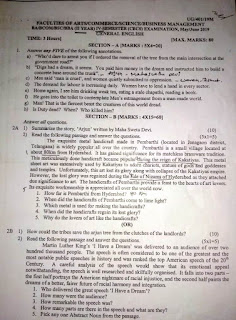Satavahana University Karimnagar Semester 3 English paper pattern 2020-2021BA/BCom/BSc/BBM
III SEMESTER B.A/ B.COM/ B.Sc/ B.B.M GENERAL ENGLISH-2020-21- TIME : 3 HOURS MARKS : 80 SECTION - A ( 4×5=20 ) I ANNOTATIONS ANSWER ANY FOUR OUT OF SIX ANNOTATIONS ( 4×5=20 ) SECTION - B ( 3X20= 60 ) ANSWER ALL QUESTIONS II A 1. ESSAY QUESTION FROM THE FIRST LESSON 10 MARKS 2. READING COMPREHENSION ( SEEN PASSAGE ) ...




